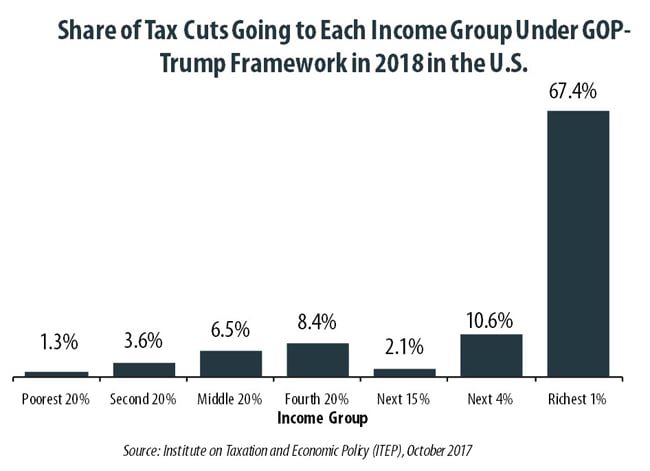It took a lot of work to make the federal corporate tax code the mess that it is today. Multinational corporations have spent decades lobbying Congress, and now the code is so loophole-ridden that companies avoid $100 billion in federal income taxes each year using offshore tax havens.
Real tax reform would focus on closing loopholes and ensuring that companies pay their fair share in taxes. Unfortunately, the recent Trump-GOP tax framework would make the tax system even worse.
Just how bad has the corporate tax code gotten? The newest edition of Offshore Shell Games, a joint report by the Institute on Taxation and Economic Policy (ITEP) and U.S. PIRG, outlines the massive scale of the offshore tax avoidance undertaken by U.S. multinationals. It’s well known that Fortune 500 companies have accumulated a stash of $2.6 trillion in earnings offshore, which has allowed them to avoid an estimated $752 billion in taxes.
These companies disclose operating a grand total of 9,755 tax haven subsidies. While this number is already high, an analysis of Federal Reserve data indicates that as much as 90 percent of tax haven subsidiaries could be going publicly undisclosed.
Companies can avoid taxes on offshore earnings because the tax code allows them to defer paying U.S. taxes on them until they are officially repatriated. This gives companies a significant incentive to use accounting gimmicks to shift their U.S. and foreign profits into tax haven jurisdictions where they will be allowed to pay nothing or close to nothing in taxes on these earnings if they keep them offshore.
But companies are clearly cooking the books. U.S. companies claim to have earned 59 percent of their offshore earnings in 10 notorious tax havens. The ridiculousness of these claims is evident simply by looking at the numbers. Profits that multinationals claim to have earned in Bermuda and the Cayman Islands add up to 18 times and 13 times each country’s entire yearly economic output, respectively. It’s simply not possible for companies to annually earn $106 billion in a country whose GDP is $6 billion.
Offshore tax avoidance on this massive scale is not inevitable. Congress could shut it down tomorrow by no longer allowing companies to defer taxes on their offshore earnings, cracking down on inversions, and requiring public country-by-country reporting of financial information by companies. Such reforms would raise a significant amount of revenue that could be used to pay for critical public investments.
But instead of considering how to reign in offshore tax avoidance, the Trump-GOP tax framework would worsen the problem by moving to a territorial tax system. Under a territorial tax system, companies would no longer owe taxes at any time on most of their offshore earnings, which means they would have an even larger incentive to shift their profits to tax havens. Put another way, moving to a territorial tax system to fix the offshore tax system is the equivalent of attempting to stop shoplifting by legalizing it. Congress should reject this approach and instead move to end offshore tax avoidance once and for all.





